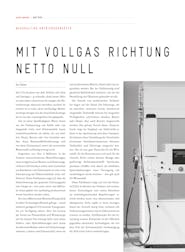Electric motors are on a roll. The trouble is, technological fixation on this particular powertrain technology won’t get us to the declared target of net zero by 2050. A new Avenir Suisse publication entitled “Nachhaltige Antriebskonzepte” (Sustainable Powertrain Technologies) not only shows why this is the case, but also sketches out better paths to reach the goal.
In various contributions, experts from Empa, the Swiss Federal Laboratories for Materials Science and Technology, question the consensus on the road to decarbonized transportation. Peter Richner (Deputy CEO) and Christian Bach (Head of Automotive Powertrain Technologies) explain why it’s not just the vehicles themselves that have to become sustainable, but the entire energy system. They also explain the important role of alternative fuels for internal combustion engines.
The new publication doesn’t just look at the topic from a technological point of view. There’s also an interview in which Morten Hannesbo, CEO of Amag, Switzerland’s biggest auto importer, and vice president of the industry association Auto Schweiz/Auto Suisse, outlines the market environment. Avenir Suisse research directors Patrick Dümmler and Jürg Müller describe the economic significance of road motor transportation. In their article they outline measures for efficiently and effectively achieving a reduction in carbon emissions. Think tank director Peter Grünenfelder finishes by examining the political implications of the current technological and economic landscape, showing how with detailed regulation, prohibitions, and subsidies, politicians are only cementing past trends rather than creating a technologically-neutral environment of effective market incentives.








